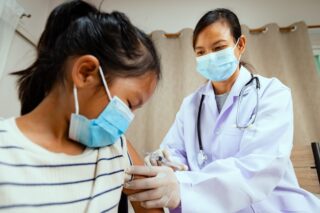
More Family/Primary Care Articles
How Can Medical Clinics Help Protect You from Mosquito Diseases?

Mosquito-borne diseases pose a serious global health threat, affecting millions worldwide every year. From malaria and dengue fever to the Zika virus and chikungunya, these illnesses can have devastating consequences if left unchecked.
In this article, we’ll explore how regular visits to medical clinics play a crucial role in protecting you and your community from mosquito-borne diseases. We’ll look at early detection methods, preventive care, treatment options, vaccination programs, and how clinics collaborate with local authorities for effective mosquito control.
KEY TAKEAWAYS
- Regular clinic visits enable early detection of mosquito-borne diseases.
- Clinics educate on prevention methods like repellents and eliminating breeding sites.
- They provide treatment plans and disease management for diagnosed cases.
- Clinics administer vaccines and promote community immunization programs.
Early Detection and Diagnosis
If caught early, many mosquito-borne illnesses can be managed effectively before causing severe complications. That’s why regular check-ups at your local clinic are so important. If you’re looking for convenient options, a simple search for “medical clinics near me” can help you find reputable facilities in your area.
During these visits, healthcare professionals can run diagnostic tests like blood work and physical exams to check for signs of infection. Some diseases have vague, flu-like symptoms initially, so these screenings are vital for prompt diagnosis.
For example, did you know that nearly 80% of Zika infections cause no symptoms at all? Without proactive testing, an outbreak could spread undetected. But by catching it early through routine clinic visits, you can get treated and take steps to avoid spreading Zika to others.
Preventive Care and Education
An ounce of prevention is worth a pound of cure, as the saying goes. One of the key ways medical clinics help protect you from mosquito-borne diseases is by providing valuable preventive education. Knowledge is power when it comes to avoiding mosquito bites and potential infections.
Clinic staff are well-equipped to advise you on effective preventive measures. They’ll explain the importance of using EPA-approved insect repellents, wearing long sleeves and pants in high-risk areas, and taking other precautions.
On top of that, they can guide you in identifying and eliminating standing water sources around your home, which are breeding grounds for mosquitoes. In some cases, they may also recommend consulting local pest control services to address mosquito infestations.
Treatment and Disease Management
If you do contract a mosquito-borne illness, clinics are equipped to provide appropriate treatment and disease management to mitigate symptoms and complications.
Depending on the diagnosis, this could include medications, IV fluids, oxygen therapy, pain relief, or supportive care. For severe cases, clinicians can coordinate hospital admission and elevated treatment protocols.
Most importantly, clinics emphasize following the full treatment plan through completion, even after initial recovery, which helps prevent relapse and reduces the risk of long-term effects like organ damage or neurological impacts.
Vaccination and Immunization Programs
While not all mosquito-borne diseases have vaccines available yet, clinics play a vital role in administering those that do to build community immunity.
Yellow fever, Japanese encephalitis, and other preventable illnesses can be stopped in their tracks through vaccination programs at clinics and public health outreach events.
In Kenya, for example, childhood vaccination campaigns at local clinics have drastically reduced cases of yellow fever in recent years. These clinics have been hailed as the frontline defense in keeping this sometimes fatal disease under control.
Clinicians also ensure people remain up-to-date on booster shots and provide advice on travel vaccinations for high-risk regions. Having a coordinated prevention strategy through local clinics benefits individuals and the broader population.
Collaborative Efforts and Community Outreach
Controlling the spread of mosquito-borne illnesses requires a united approach across many fronts. That’s why medical clinics frequently partner with government agencies, nonprofits, community groups, and environmental organizations for education and mosquito management efforts.
Your local clinic might host seminars on eliminating breeding grounds around homes and workplaces. They could distribute prevention resources door-to-door or launch media campaigns about pest control best practices.
This combined approach gets the entire community involved in mosquito mitigation strategies. After all, reducing mosquito populations doesn’t just help lower disease risk—it also improves the quality of life by minimizing those incessant buzzing and itchy welts.
In short, your neighborhood medical clinic is a powerful ally and resource in the fight against mosquito-borne diseases on multiple levels. So take full advantage!
Concluding Thoughts
Clinicians provide early detection screening, preventive education, appropriate treatment protocols, vaccination access, and coordination of broader community mosquito control initiatives. Don’t wait until you’re suffering symptoms to take mosquito-borne diseases seriously. Embrace your clinic’s services as a vital tool for protecting your health and that of your loved ones. A few simple preventive steps could make all the difference.
Other Articles You May Find of Interest...
- Top 6 Tips to Prepare for Your Family Nurse Practitioner Certification Exam
- Choosing the Right Primary Care Doctor: Your Guide to Better Health
- Strategies for Maintaining Adequate Hydration Throughout the Day
- Advantages of NEBOSH Compared to Other Health and Safety Qualifications
- Nine Tips for Nurses to Advance Their Skills and Expertise
- Why Do Companies Use Worker Hair Drug Tests?
- How Obtained Data from Healthcare Breaches is Used

















